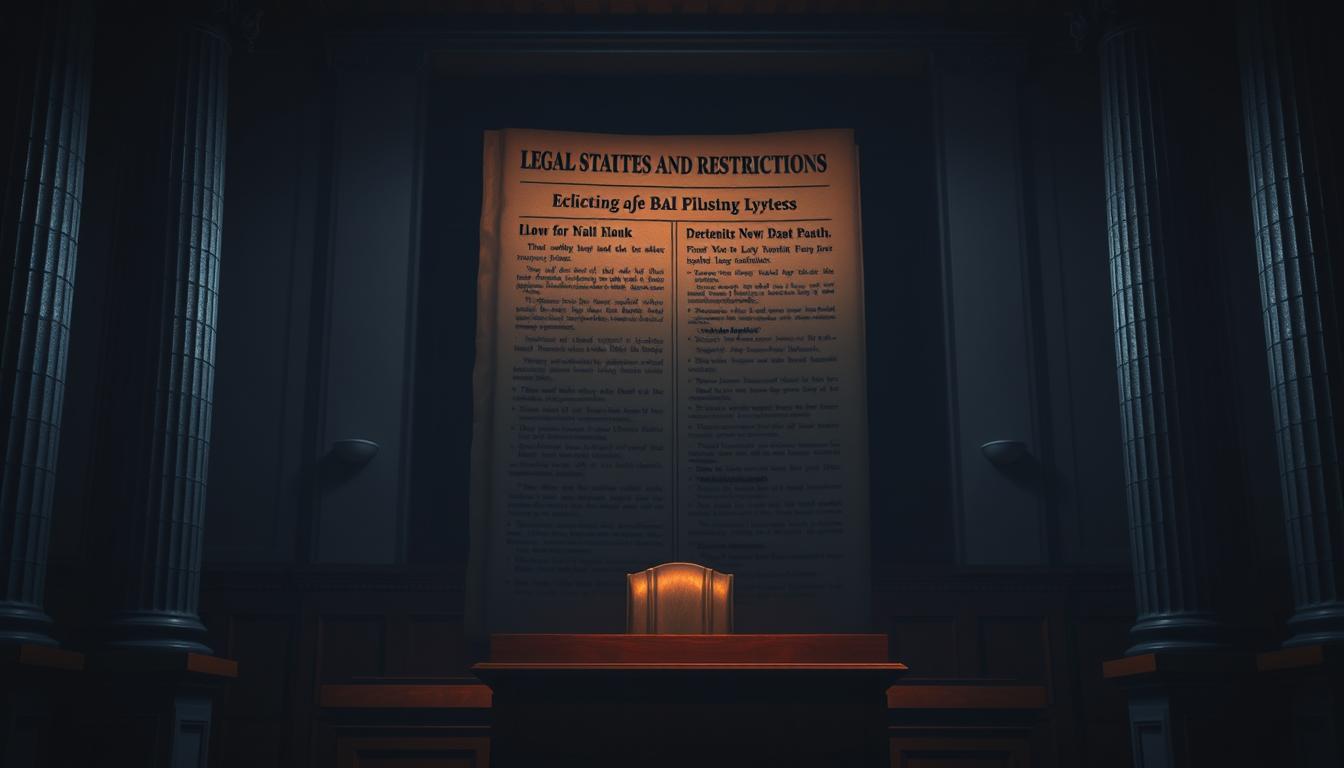
23 Sep What Crimes are not Eligible for a Bond?
In the United States, the fate of someone charged with a crime often depends on one key question: Are they eligible for bond? Some crimes are so serious that bail is not an option. Understanding crimes not eligible for bond and legal restrictions for bail shows how the justice system protects society and enforces laws.
Those accused of serious felonies often face bond ineligibility reasons because of the severity of their alleged crimes. Drug-related offenses, like drug trafficking, also limit eligibility for bond. This is because the risks to the community and the chance of flight are too high. Crimes seen as morally wrong also block bail, showing society’s strong stance against such behaviors.
Crimes involving violence make it hard to get bond. Courts often deny bail for these crimes to keep the public safe and ensure the accused faces trial. These decisions highlight the justice system’s dedication to fairness and community safety.
Overview: Understanding Bail and Bond Processes
In the judicial system, bail and bond are key to managing who gets out before trial. Bail is a direct payment to the court, making sure the defendant shows up for trial. On the other hand, a bond is through a bail bond agency, like Armstrong Bail Bonds. Here, a third party promises the defendant will appear in court.
To qualify for a bond, the court looks at several things. They check the defendant’s past crimes, their connections to the community, and the charges they face. These factors help decide if the defendant can be free before trial.
The Difference Between Bail and Bond
Bail and bond both aim to ensure the defendant shows up in court. But they work differently. Bail is a payment to the court, while a bond uses a third party to guarantee the defendant’s appearance.
General Criteria for Bond Eligibility
Understanding the rules for bond eligibility is important. The court looks at the crime’s severity, if the defendant might flee, and their past crimes. For more details, check out resources like Justia.
The Role of Court Decisions in Bail Denials
Court decisions are key in deciding bail eligibility. If a judge thinks the defendant might flee or is a danger, they can deny bail. These decisions are important, making sure only the right people get bail.
Specific Criminal Charges and Bail Eligibility
In the world of criminal justice, some crimes have strict bail revocation conditions. This is because they are very serious. People facing denied bond arrest offenses are seen as a higher risk to society or might try to escape. Knowing this is key for lawyers and those accused.
Crimes with no bond option include serious felonies, major drug crimes, or acts of moral turpitude. These are too serious for bail. You can learn more about these on this Governmental Justice Page. It lists offenses and their bail conditions in detail.

Now, let’s talk about specific crimes that often lead to bail revocation conditions. These include:
- High-level drug trafficking or violent crimes, indicating harm to the community.
- Crimes committed while already on a release, showing disregard for legal rules.
- Offenses involving a weapon, if there’s a history of similar actions.
This focus on public safety and flight risk is why denied bond arrest offenses are strict. It ensures bail decisions balance society’s safety with the accused’s rights.
In summary, knowing about crimes with no bond option helps a lot in the early stages of a criminal case. For more information, check out legal frameworks and bail conditions for each charge. You can find this in detailed resources like the Justice Department’s bail and bail revocation guidelines.
Understanding Immigration Bonds and Eligibility
Immigration bonds are a special kind of bail for people held by Immigration and Customs Enforcement (ICE). They let detainees stay free until their immigration hearings are over. The rules for getting bail in immigration cases are strict, mainly because of any criminal charges bail conditions they face.
Immigration bonds are complex because of the crimes ineligible for bail. These include serious crimes like aggravated felonies, drug trafficking, or anything seen as a threat to public safety. It’s key for detainees and their lawyers to know which crimes make them ineligible for a bond.
To qualify for an immigration bond, a detainee must not be a danger to the community or likely to flee. This decision looks at things like family ties in the U.S., job history, and past court compliance. Other factors are also considered.
Knowing the eligibility criteria for bail and how criminal charges bail conditions affect it is vital. It affects not just their chance to get out on bond but also their whole immigration case.
Aggravated Felonies: A Barrier to Bond Eligibility
Aggravated felonies are serious crimes that affect bail restrictions and criminal charges without bond. These include severe acts like murder, rape, and major drug trafficking. Such crimes are so severe that many people cannot get a bond.

For those charged with aggravated felonies, bond eligibility crimes are a big legal challenge. These crimes include not just violent acts but also some theft and fraud. This shows how strict bail rules can be for these cases.
Being charged with an aggravated felony has serious consequences. You might face mandatory detention and strict bail rules. These rules limit your options and make it hard to fight your charges from outside jail.
The term “aggravated felony” also has long-term effects. It can limit your access to civil rights and liberties. So, it’s important to know about aggravated felonies if you or a loved one might face these charges.
Drug Offenses and Bond Eligibility
When we talk about drug offenses and bond eligibility, it’s key to know how they affect bail denial. Drug-related charges, like trafficking or possession with intent to distribute, are often bond ineligible crimes. This means you might not get bail in some cases.
Bail ineligibility factors for drug crimes depend on the crime’s severity. For instance, admitting to a controlled substance offense can affect your bond eligibility. This is true, even if there’s suspicion of drug trafficking. More on this can be found in the discussion on bond for crimes related to controlled substances on Midnight Bail Bonds website.
| Offense Type | Impact on Bond Eligibility |
|---|---|
| Controlled Substance Violation | Highly likely to result in bail denial |
| Drug Trafficking | Severe restriction on bond eligibility |
| Posession with Intent to Distribute | Potential for bail being barred |
Being accused of drug trafficking can have big consequences. Immigration authorities see these charges as serious threats. This often leads to bail denial. It’s important to understand these bail ineligibility factors when dealing with bond ineligible crimes.
Moral Turpitude Crimes and Their Effect on Bond
Crimes involving moral turpitude are serious. They go against what is right and what society expects. These crimes are often seen as crimes with no bond. They show a person’s bad character and can lead to denied bail offenses.
Crimes like fraud, theft, or causing harm are seen as very bad. They are punished harshly to keep the community safe. Here are some examples:
- Theft or fraud, which shows dishonesty for personal gain.
- Sexual offenses, which are illegal and morally wrong.
- Physical assault or bodily harm, showing a lack of ability to live peacefully.
Having a crime involving moral turpitude in your past can hurt your chances of getting a bond. Judges think these crimes show deep character flaws. They worry these flaws could be a danger to others.
Crimes of Violence and Bail Denials
Violent crimes often lead to a bail denial for violent crimes because of public safety concerns. It’s important to understand why some crimes result in strict bail conditions or denial.
Looking into violent crimes bail denial shows a clear reason: the severity of the acts. Judges use a strict no bond offenses list for crimes seen as too dangerous to allow freedom before trial.
Some violent crimes always mean no bail. For example, murder, aggravated assault, and domestic violence are often on the no bond offenses list. The courts see these crimes as threats to public safety if the accused is released.
Keeping these offenders in jail is a key part of keeping communities safe. This strict policy shows the justice system’s effort to balance individual rights with public safety.
Conclusion
The United States’ judicial system is complex, with bail eligibility being a key part. It involves legal criteria, judicial discretion, and the type of crime. Some crimes, like those threatening public safety, often mean no bail.
This strict rule helps keep the community safe. It ensures dangerous individuals can’t harm society while their case is being decided.
Not all crimes are treated the same. Crimes like aggravated felonies, drug trafficking, and violent acts get stricter bail rules. This shows the system’s focus on safety and fairness.
Knowing about bail eligibility is important for everyone. It helps defendants, lawyers, and the community understand the system. The decision to grant bail depends on many factors, showing a strong commitment to law and order.
Those facing the criminal justice system should learn about these rules. Seeking good legal advice is also key. This way, they can better understand what to expect and prepare for their legal journey.

